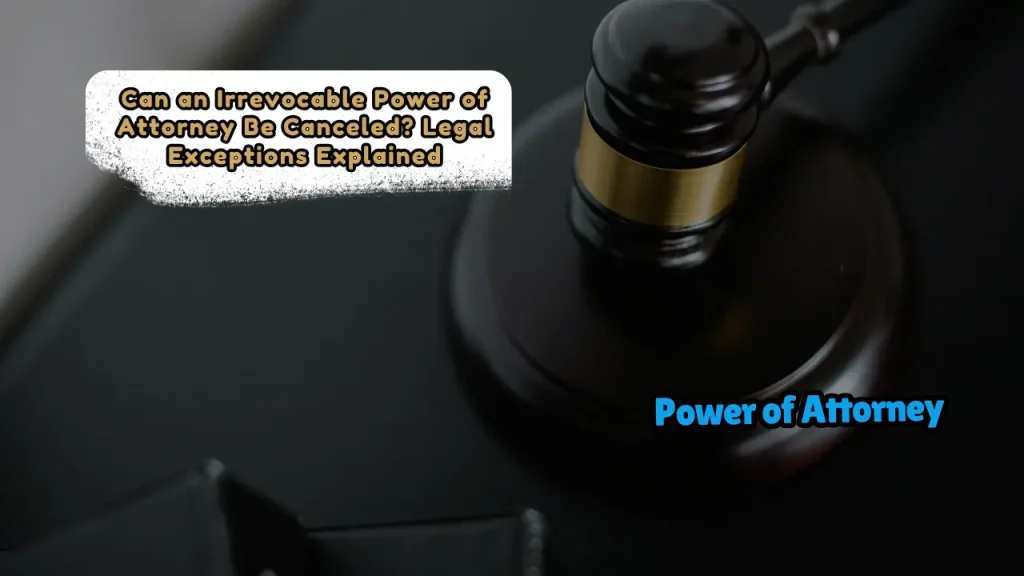Can an Irrevocable Power of Attorney Be Canceled? Legal Exceptions Explained
Yes, an irrevocable power of attorney (POA) can sometimes be canceled, but only under specific legal circumstances. Unlike a revocable POA, which the principal can terminate at any time, an irrevocable POA typically requires the agent’s consent, court intervention, or proof of misconduct to revoke.
Table of Contents
What Is an Irrevocable Power of Attorney?
An irrevocable POA is a legal document that grants an agent authority to act on the principal’s behalf but cannot be easily revoked or modified once signed. These are often used in high-stakes scenarios where the agent has a financial or legal stake, such as:
- Securing a loan where the agent manages collateral.
- Overseeing long-term business transactions.
- Protecting assets in complex estate planning strategies.
Irrevocable vs. Revocable POA: Key Differences
| Aspect | Irrevocable POA | Revocable POA |
| Cancellation During Life | Requires agent’s consent or court order. | Principal can cancel anytime. |
| Flexibility | Binding and difficult to modify. | Easily amended or revoked. |
| Common Uses | Loans, business deals, asset protection. | General financial/healthcare management. |
When Can an Irrevocable POA Be Canceled?
While irrevocable POAs are designed to be permanent, termination may be possible in these situations:
1. Mutual Agreement
The principal and agent can agree to cancel the POA in writing. This requires clear documentation and often legal oversight to ensure enforceability.
2. Agent Misconduct
If the agent abuses their authority (e.g., fraud, theft, or acting against the principal’s interests), the principal can petition a court to revoke the POA.
3. Completion of the POA’s Purpose
If the POA was created for a specific task (e.g., managing a loan), it may automatically expire once the task is completed.
4. Court Order
A judge may invalidate the POA if:
- The principal was coerced or lacked mental capacity when signing.
- The document violates state laws or public policy.
5. Death or Incapacity
All POAs, including irrevocable ones, terminate upon the principal’s death. If the principal becomes incapacitated, a durable irrevocable POA may remain active unless challenged in court.
Related article for you:
Can a Power of Attorney Withdraw Money After Death?

Steps to Cancel an Irrevocable Power of Attorney
- Review the POA Document: Check for clauses outlining termination conditions or expiration dates.
- Negotiate with the Agent: Seek mutual consent to revoke the agreement in writing.
- File a Court Petition: Submit evidence of agent misconduct, undue influence, or incapacity.
- Notify Third Parties: Send formal revocation notices to banks, government agencies, and other relevant institutions.
- Create a New POA (if needed): Replace the revoked POA with a revocable or updated irrevocable document.
Risks of Wrongful Cancellation
Attempting to cancel an irrevocable POA without legal justification may lead to:
- Breach-of-Contract Lawsuits: If the POA is tied to a financial agreement (e.g., a loan).
- Agent Disputes: The agent could challenge the revocation in court.
- Financial Penalties: Courts may order compensation for losses caused by improper termination.
Key Takeaways
- Irrevocable POAs are binding but not always permanent—they can be canceled with agent consent, court orders, or proof of wrongdoing.
- Death automatically invalidates all POAs, including irrevocable ones.
- Legal guidance is critical to avoid disputes or penalties when revoking an irrevocable POA.
Consult an estate planning or contract attorney to evaluate your options and ensure compliance with state-specific laws.
This article is for informational purposes only. Laws vary by jurisdiction—always seek professional legal advice for your situation.
About the Author

Sarah Klein, JD, is an experienced estate planning attorney who has helped clients with wills, trusts, powers of attorney, and probate matters. At All About Lawyer, she simplifies complex estate laws so families can protect their assets, plan ahead, and avoid legal headaches during life’s most sensitive moments.
Read more about Sarah
